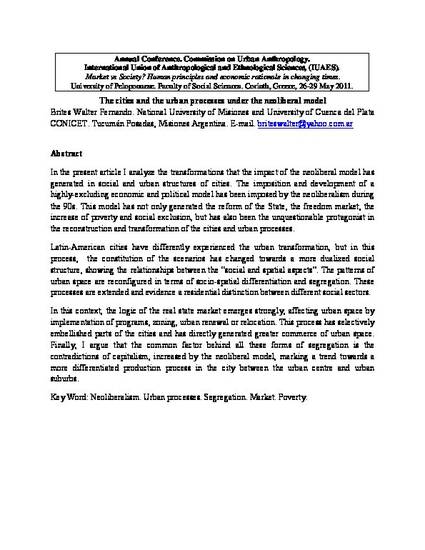
Dissertation
The cities and the urban processes under the neoliberal model.
(2011)
Abstract
In the present article I analyze the transformations that the impact of the neoliberal model has generated in social and urban structures of cities. The imposition and development of a
In Latin America, the Social Sciences have increasingly approached the study of
urban transformation under the Neoliberalism; some approaches analyzed the effects that
highly-excluding economic and political model has been imposed by the neoliberalism during
it brings to the marginal populations. Specifically, in the anthropological literature, there
the 90s. This model has not only generated the reform of the State, the freedom market, the
have been many questions that have guided the study of the impact of the Neoliberal
increase of poverty and social exclusion, but has also been the unquestionable protagonist in the reconstruction and transformation of the cities and urban processes.
model in both urban transformation and the living conditions of its inhabitants.
Latin-American cities have differently experienced the urban transformation, but in this process, the constitution of the scenarios has changed towards a more dualized social
In Latin America, the cities have differently experienced the impact of the
structure, showing the relationships between the “social and spatial aspects”. The patterns of
neoliberal model. The decade of the nineties has marked the peak of this great
urban space are reconfigured in terms of socio-spatial differentiation and segregation. These
transformation. The restructuring of the State and free market not only led to huge cuts
processes are extended and evidence a residential distinction between different social sectors.
in social expenditures and freedom to private initiative, but also gave rise to situations of
In this context, the logic of the real state market emerges strongly, affecting urban space by
increased vulnerability, poverty, unemployment and social exclusion.
implementation of programs, zoning, urban renewal or relocation. This process has selectively
embellished parts of the cities and has directly generated greater commerce of urban space.
Finally, I argue that the common factor behind all these forms of segregation is the
The reforms introduced by neoliberal policies and economic changes have had an
contradictions of capitalism, increased by the neoliberal model, marking a trend towards a
important influence not only in the social structure but also in the physical structure of
more differentiated production process in the city between the urban centre and urban
suburbs.
the cit
Keywords
- Neoliberalism. Urban processes. Segregation. Market. Poverty.
Disciplines
Publication Date
Spring May 28, 2011
Comments
“The cities and the urban processes under the neoliberal model”. Bulletin Commission on Urban Anthropology (CUA). International Union of Anthropological and Ethnological Sciences,(IUAES). http://korinthos.uop.gr/~anthropology/index.htmlCorinth, Greece, May 2011.
Citation Information
Walter F Brites. "The cities and the urban processes under the neoliberal model." (2011) Available at: http://works.bepress.com/walterf-brites/8/
